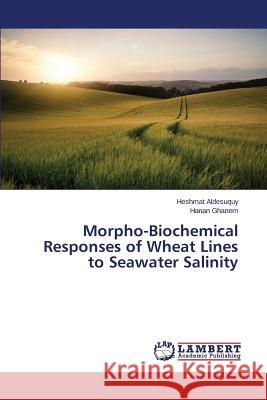Morpho-Biochemical Responses of Wheat Lines to Seawater Salinity » książka
Morpho-Biochemical Responses of Wheat Lines to Seawater Salinity
ISBN-13: 9783848483587 / Angielski / Miękka / 2014 / 232 str.
This work was conducted to evaluate the impact of seawater irrigation on growth, metabolism and ultrastructure of chloroplasts and oleosomes in flag leaf of wheat (Triticum aestivum L.), salt sensitive "Gemmieza-9" and salt resistant "Sids-1," cultivars. Among the cultivars, Sids-1 "salt tolerant" showed a better performance and produced more biomass under salt stress when compared with Gemmieza-9 "salt sensitive." Furthermore, it is clear from this work that the impact of seawater irrigation at 10% or 25% on both wheat cultivars particularly sensitive one had a negative effect on growth vigor of root and shoot, leaf area expansion, pigments content, membrane stability, relative water content, protein content, DNA, RNA as well as ultrastructure of chloroplasts and oleosomes of flag leaf during grain filling. On the other hand, seawater stress resulted in accumulation of inorganic ions, organic solutes, glycerol and saturated fatty acids which in turn involved with cell protection and osmotic adjustment. In addition salinity induced plant defense machinery with varying degrees in both wheat cultivars by enhancing the activity of antioxidant enzymes.
This work was conducted to evaluate the impact of seawater irrigation on growth, metabolism and ultrastructure of chloroplasts and oleosomes in flag leaf of wheat (Triticum aestivum L.), salt sensitive "Gemmieza-9" and salt resistant "Sids-1", cultivars. Among the cultivars, Sids-1 "salt tolerant" showed a better performance and produced more biomass under salt stress when compared with Gemmieza-9 "salt sensitive". Furthermore, it is clear from this work that the impact of seawater irrigation at 10% or 25% on both wheat cultivars particularly sensitive one had a negative effect on growth vigor of root and shoot, leaf area expansion, pigments content, membrane stability, relative water content, protein content, DNA, RNA as well as ultrastructure of chloroplasts and oleosomes of flag leaf during grain filling. On the other hand, seawater stress resulted in accumulation of inorganic ions, organic solutes, glycerol and saturated fatty acids which in turn involved with cell protection and osmotic adjustment. In addition salinity induced plant defense machinery with varying degrees in both wheat cultivars by enhancing the activity of antioxidant enzymes.











